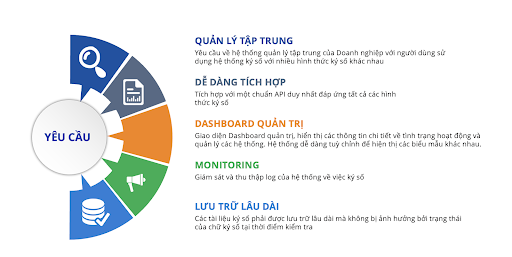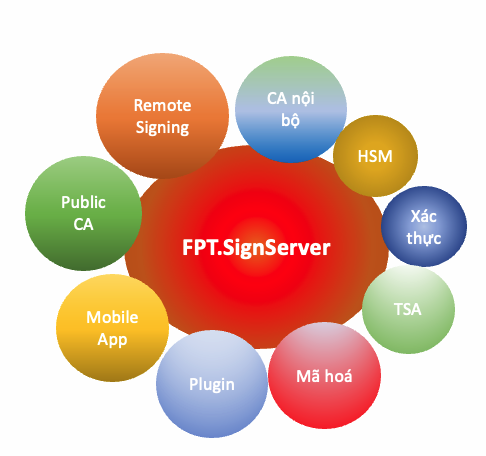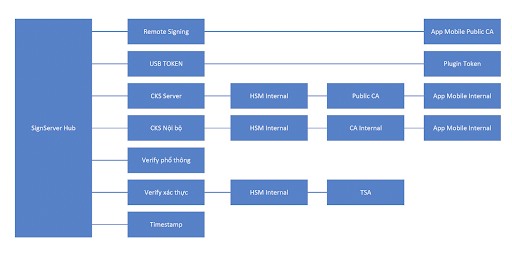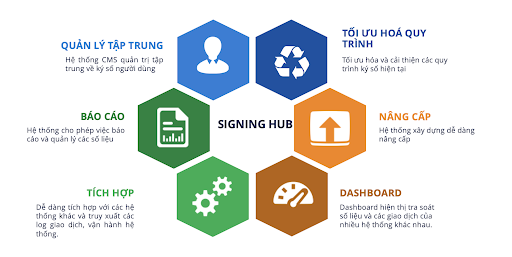Signing Hub and Opportunities for Businesses
Decree 130/ND-CP/2018 on digital signatures and electronic verification services has opened a new stage in the use and application of digital signatures in official documents in Vietnam. This milestone of traditional to digital signature transition aims to enhance electronic transaction security and legality.
Specifically, Decree 130/ND-CP/2018 clearly stipulates principles and processes for the use of digital signatures in official documents, including verifying data integrity, and identifying the signer and the validity of the signature. This helps increase transparency and trust in online transactions, as well as reduce the risk of fraud and legal disputes.
1. Using digital signatures
Today, the use of digital signatures is a significant part of document processing and electronic transactions at organizations, businesses, and government agencies. However, the diversity in digital signature implementations has posed a number of challenges in its integration and effective use.
| Requirements | Centralized Management | A centralized management system for organizations to manage users of different digital signature systems with various digital signing methods |
| Easy Integration | Integration using a single API standard, serving all types of digital signature | |
| Administration Dashboard | An Administration Dashboard that displays detailed information about operating statuses and management of different systems. Customizable to display different layouts | |
| Monitoring | Monitoring and collection of system’s digital signing logs | |
| Long-term Storage | Digitally signed documents must be stored long-term without being affected by the status of the digital signature at the time of inspection |
One of these obstacles is the diversified use of both traditional USB Token-based digital signatures and remote ones. While the USB Token method is preferred by some organizations and individuals thanks to its high security and convenience in storage and management, remote digital signing systems are becoming increasingly popular due to their flexibility and ease of distant management. This varied use creates a complex environment, especially when it comes to integrating different digital signature systems with each other or with other document management systems provided by diverse digital signature providers.
The biggest challenge faced by organizations for the integration and use of digital signature systems is the inconsistency between technical methods and standards, which may complicate system connection and integration, increasing implementation costs and time. Furthermore, digital signature system management and maintenance also requires technical knowledge and significant resources from organizations.
To overcome these hurdles, organizations need to seek flexible and trouble-free integration solutions and, at the same time, ensure compatibility and compliance with international technical standards. Collaboration between solution providers and users’ organizations is an important factor in addressing these challenges.
Responding to these demands, FPT-CA has researched and developed Signing Hub, a comprehensive digital signing system for effective digital signatures in agencies and organizations.
2. Overview of the Signing Hub solution
Signing Hub has been created by leveraging FPT-CA’s experience in digital signature infrastructure and PKI development, as well as available platforms of the FPT-CA system, including:
– Centralized Digital Signature and Verification platform, CoreCA;
– USB Token-based Digital Signature platform;
– Remote Signing solution, FPT eSign;
– FPT TimeStamp solution;
The solution features a comprehensively integrated platform for digital signature and data security without limitations on digital signing methods, such as USB Token, remote, and internal digital signing, for documents of different types, including contracts, invoices, diplomas, etc.
3. Current demand for digital signing
Currently, the market is being flooded with numerous digital signature platform providers, of which 25 providers offer public CAs and 10 suppliers render remote digital signature solutions. Having a large number of service providers makes it complicated to integrate digital signature solutions into customer applications on both remote and USB token-based signing platforms. Even worse, the customers have to carry out the integration on a provider basis, wasting their resources and prolonging implementation times. This boosts customers’ demand for a unified system that comes with a full range of digital signing methods, capable of offering their clients and partners hassle-free system integration and digital signing.
4. Demand for long-term verification and trusted time:
Current digital signing solutions on the market mostly use the time on the customer’s computer or on the server as the digital signing time, leading to non-standardization and unreliability of digitally signed documents. A manual check of digitally signed documents via third-party software such as Acrobat Reader, Foxit Reader, and so on, is time-consuming and challenging without expertise in digital signatures. The verification of digitally signed documents with expired or revoked digital signatures using OCSP and CRL methods cannot be performed at the time of checking, making it difficult to assess the validity of these documents.
5. Demand for document circulation
The management of digitally signed documents is currently being done on the user’s personal computer, forcing the storage and sharing of these documents for different purposes to be either manual or significant hassle in the network environment.
Key features of the solution:
Responding to those practical needs, Signing Hub solution comes with the following features:
– Digital signing using USB Token devices from all providers via Plugin. The Plugin can be easily integrated into current popular Web browsers such as Microsoft Edge, Firefox, Safari, Chrome, and others.
– Remote digital signing that is offered by all licensed remote digital signing providers on the market.
– Internal digital signing that is integrated with the CoreCA system, capable of issuing internal digital certificates within the organization and carrying out internal digital signing with various verification methods, including Pincode, SMS/Email OTP, mobile App (Face, Fingerprint…), etc.
– FPT Timestamping solution, FPT TSA: Ensures that the creation time of digital signature on documents is accurate and synchronized with the standard time of the Vietnam Metrology Institute, and the timestamp applied to that digital signature is certified by the Vietnamese Ministry of Information and Communications. During the digital signing process, validating a digital signature on documents at the time of signing can be done by enabling long-term validation function. Digitally signed documents are guaranteed to be valid and can be checked without any time limit.
– A system for verification of digitally signed documents of different types, such as PDF, XML, Office, and so on, from unlimited providers, making Signing Hub a trusted verification portal in electronic transactions.
| Signing Hub | Centralized Management | Centralized management system to manage users’ digital signing |
| Reporting | Data reporting and management | |
| Integration | Hassle-free integration with other systems and retrieval of transaction and system operation logs | |
| Process Optimization | Optimization and enhancement of current digital signing process | |
| Upgrades | Easy to upgrade | |
| Dashboard | Dashboard that displays data and transactions of different systems |
– User management system: register digital signing methods, check digital signing frequency and traffic, monitor and evaluate users during their use of the system.
– Multi-platform deployment: Signing Hub can be deployed on different platforms like OnPremise, Cloud, MicroService, and others.
Benefits the Signing Hub system offers
Using Signing Hub helps boost the connections between businesses, organizations, and individuals, thus facilitating the electronic transaction process. In addition, the solution is also: Capable of integrating FPT’s existing services, eSign and Timestamp; Promotes the digitalization of processes within the enterprise; Ensures reliability and legality of electronic documents during electronic transactions; Minimizes inconsistencies and difficulties in the electronic document checking process; Can be deployed on a large scale with a huge number of users, and is considered the leading solution in document circulation and anti-counterfeiting of paper documents; and Synchronizes processes between paper and electronic documents.
In summary, the Signing Hub system not only simplifies the digital signing and document verification process, but also meets a series of strict requirements for security, performance, and compatibility. Equipped with flexible and diverse integration of various features such as remote digital signing, timestamping, and document storage, the solution offers great benefits to organizations and businesses in information security strengthening, work process optimization, and user experience enhancement.
As Signing Hub’s potential and necessity are becoming significant in today’s business landscape, the implementation and integration of this product are being given precedence and constitute an important step in ensuring information security and reliability in an ever-evolving digital environment. All of those features make Signing Hub both a useful tool and a reliable partner in the digital transformation journey of organizations and businesses.
| Exclusive article by FPT IS Expert
Author Le Viet Cuong – Director of Digital Signature Authentication Service Center, FPT IS |
















